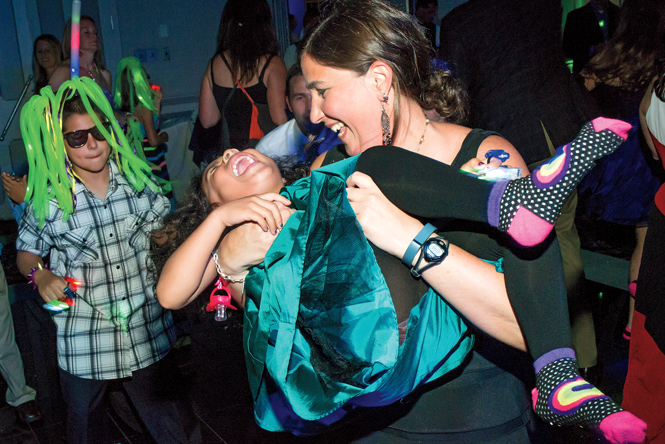By Naomi Shulman
She was a single rabbi who wanted to be a mom. People told her, “Don’t worry—you’ll meet the right person.”[Adoption] When Lisa Gelber ’89 first arrived at Amherst, she knew two things in her bones: she wanted to be a rabbi, and she wanted to be a mother. She had no idea how she’d achieve the first. “I didn’t even have a framework yet,” she says. “I didn’t know women rabbis in any movement of Judaism.” As it turned out, the path to the rabbinate was fairly smooth. Her journey to motherhood, however, ended up being far longer and more complicated.
As detailed in the documentary All of the Above: Single, Clergy, Mother, which aired on ABC last spring and is part of the Big Apple Film Festival this fall, Gelber found herself unpartnered in her late 30s—a state of being that is frowned upon in many quarters, including Jewish tradition.

After a years-long struggle, Gelber received the call that a newborn girl was waiting for her. Zahara is now almost 5.
“It goes back to the story of Noah—you’ve gotta be a twosome or something’s wrong,” she says with a wry laugh. “Whenever I’d say, ‘I want to be a mom,’ people replied, ‘Don’t worry—you’ll meet the right person.’ I still want to meet the right person! Ultimately I had to set that expectation aside.”
But first came years of questioning. Having packed intense work experiences into relatively few years—Gelber led a large congregation and worked as a chaplain at a major hospital in Seattle, before landing as associate dean at the Jewish Theological Seminary—she was trained to approach dilemmas Talmudically. As she considered the ways in which single women might become mothers, she says, “I did a lot of research into what the tradition says in terms of halacha [Jewish law].”
But eventually, she realized she would have to go her own way, even if it meant breaking some ground. “One can honor marriage without being married,” Gelber decided. “By disentangling marriage and motherhood, we invite ourselves to widen our lens on who can parent and under what circumstances.”
Despite making peace with her decision to become a single mother, Gelber’s struggle was not over; she underwent three rounds of IVF, a miscarriage and the eventual discovery that she probably never would have been able to sustain a pregnancy. She began looking into Ethiopian adoption—and then Ethiopia closed the process to single mothers. Gelber took solace in the story of Jacob wrestling with the angel. “I feel in my body what Jacob went through to get what he needed. He gets a new name—Israel, ‘the one who struggles’—and I feel like that is my story,” she says. “Jacob holds on and demands a blessing. He wouldn’t let go.”
Gelber did not let go, either. After a struggle that stretched on for years, she received the call that a newborn girl was waiting for her in Westchester County, N.Y. Gelber named her Zahara. “It means ‘radiance,’ and she is a constant light in the world.”
Now Zahara is almost 5, and Gelber sees that the identities she always knew were hers—rabbi and mother—inform and support each other. “Part of my call to the rabbinate has to do with being able to give people the space to be, without telling them what to think or feel. I’m really honing that practice as a parent. The practice of awareness and intentionality is critical to being both a good rabbi and a good mother. Striving for that internal balance from moment to moment strengthens my potential as a rabbi, and as Zahara’s mom.”
Naomi Shulman has written for The New York Times, Real Simple and other publications.
Kim Cassidy photo